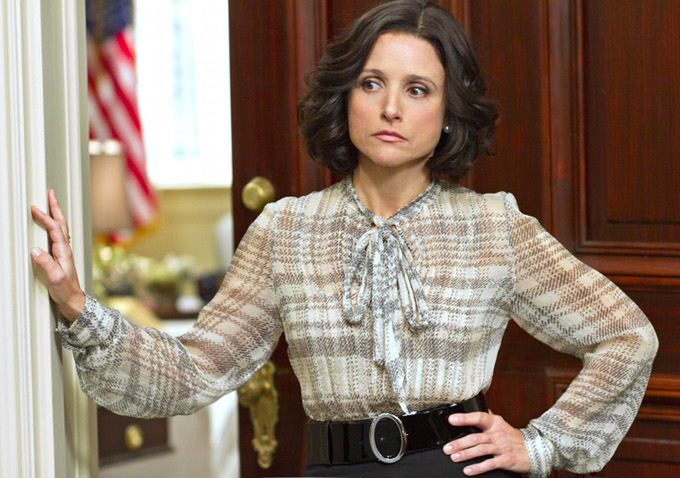 Season 1, Episode 1: "Fundraiser"
Season 1, Episode 1: "Fundraiser"
In the midst of an election season, where politics in the United States seems to be more partisan than it ever has been, and riding on the back of the Occupy Wall Street movement that spread across the world last year, there is probably no better time for a political comedy. And for Armando Iannucci, it's territory that he's already mined to great success. British TV viewers were first acquainted with his work with the series "The Thick Of It" (which was remade by ABC for a potential series, that never made it past pilot and was disowned by Iannucci), while audiences on both sides of the pond applauded "In The Loop." HBO is the ideal home for Iannucci to make his American debut (if only to drop f-bombs, which the script does quite often), but it's shame that this debut episode is so toothless.
Where "In The Loop" used the Iraq war as the background to satirize political machinery in both the United States and United Kingdom, "Veep" is much more lightweight, and from the outset mostly plays like a Washington-based version of "The Office." A very game and very good Julia Louis-Dreyfuss leads the cast as Selina Meyer, the titular Veep who as second-in-command doesn't find herself having to deal with the pressing issues facing the nation. In fact, when this premiere episode starts, she is working on getting cornstarch cutlery to be used on Capitol Hill instead of plastic. And she's got a willing group of staffers to help her.

A pretty great supporting cast surrounds Louis-Dreyfuss as part of her fiercely loyal team with the sharp Anna Chlumsky (yes, of "My Girl" fame) as Amy, the chief of staff; Matt Walsh as her spokesperson and media representative Mike; Tony Hale as Gary her bodyman, stylist of sorts and general right hand; with Sufe Bradshaw playing Sue, the Veep's no nonsense secretary. While Chlumsky will be a revelation to many and likely receive a lot of deserved ink, guys like Walsh and Hale are so effortless they might get overlooked. But we can't forget Timothy C. Simmons, who as the young naive aide to the White House enjoys lording his status as a member of the office of the President Of The United States, even if he is wildy out of his depth from the more seasoned and cynical folks in Washington. He might come off a bit one note here, but in later episodes he offers a nice alternate comedic tone.
It's just too bad that everyone is connected here for material that is never quite as biting as you might hope. Shot in the run-and-gun style Iannucci prefers, the effect is that the show moves very fast, but since their are no stakes, the breathless editing is not really in service of anything narratively. And on a larger level, that is Iannucci's point — that the relatively powerless Veep does have to spend her day working tirelessly on matters of little consequence. In this episode, Selina begins work on trying to put together her Clean Jobs Commission (a thread will follow in later episodes), one that immediately finds her having to please both oil lobbyists (who are already against the cornstarch cutlery) and environmental interests in Washington. The show won't get the manuvering that will involve just yet, as the bulk of the show's plot is centered around the death of Senator "Rapey" Reeves, a longtime fixture in Washington know mostly for his wandering hands on any women he encountered. But in Washington fashion, due respect must be paid but the Veep has a minor crisis on her hands when Amy accidentally signs the official card going to the widow with her own name instead of the Veep's.
Iannucci wants to highlight the absurd and surreal dullness of the Veep's day-to-day work, but doesn't have much to say about it beyond that point. And this is highlighted by a running gag that has Selina constantly asking Sue, "Did the President call?" (The answer is always is no.) The joke is tired by the end of the show (and exhausted completely when it's brought up again and again in the following episodes), but it's Iannucci hammering home the point that the Veep is completely disengaged from any real political activity. Thus, the show falls into a murky middle ground where it's both a mildly stinging satire and gently amusing workplace comedy, but as a viewer, you wish it would choose a side and run with it. [B-]

